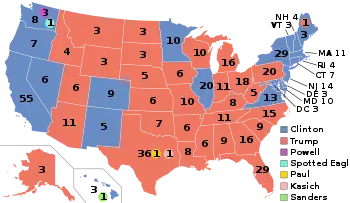2016 United States presidential election in New Hampshire
The 2016 United States presidential election in New Hampshire was held on Tuesday, November 8, 2016, as part of the 2016 United States presidential election in which all 50 states plus the District of Columbia participated. New Hampshire voters chose electors to represent them in the Electoral College via a popular vote, pitting the Republican Party's nominee, businessman Donald Trump, and running mate Indiana Governor Mike Pence against Democratic Party nominee, former Secretary of State Hillary Clinton, and her running mate Virginia Senator Tim Kaine. New Hampshire has four electoral votes in the Electoral College.[2]
| ||||||||||||||||||||||||||
| Turnout | 69.1% [1] | |||||||||||||||||||||||||
|---|---|---|---|---|---|---|---|---|---|---|---|---|---|---|---|---|---|---|---|---|---|---|---|---|---|---|
| ||||||||||||||||||||||||||
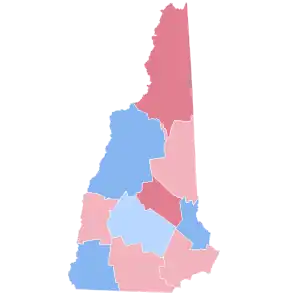

| ||||||||||||||||||||||||||
| ||||||||||||||||||||||||||

| Elections in New Hampshire |
|---|
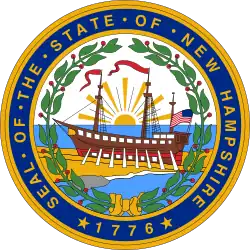 |
Clinton won the state with 47.62% of the vote, while Trump lost with 47.25%, by a 0.4% margin or by 2,736 votes. This marked the second-closest margin percentage in the presidential election, behind only Michigan and was Clinton’s closest margin of victory of any state. As of 2020, this is the most recent election in which a Republican won Carroll, Hillsborough, Rockingham, and Sullivan Counties, as well as the last time New Hampshire voted more Republican than the nation as a whole. This is the closest that a Republican nominee has come to carrying New Hampshire since it last voted Republican for George W. Bush in 2000. This also marks the only time that a non-incumbent Republican won the White House without New Hampshire, along with the only time other than 2004 in which any Republican was elected president without the state.
Primary elections
As per tradition and by New Hampshire electoral laws,[3] New Hampshire holds the primaries before any other state. As a result, candidates for nomination usually spend a long period campaigning in New Hampshire.
Democratic primary
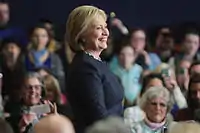

In the New Hampshire Democratic primary taking place on February 9, 2016, there were 24 pledged delegates and 8 super delegates that went to the Democratic National Convention. The pledged electors were allocated in this way. 16 delegates were allocated proportionally by congressional district (8 delegates per district). The other 8 delegates were allocated based on the statewide popular vote.[4]
Results
| New Hampshire Democratic primary, February 9, 2016 | |||||
|---|---|---|---|---|---|
| Candidate | Popular vote | Estimated delegates | |||
| Count | Of total | Pledged | Unpledged | Total | |
| Bernie Sanders | 152,193 | 60.14% | 15 | 1 | 16 |
| Hillary Clinton | 95,355 | 37.68% | 9 | 6 | 15 |
| Martin O'Malley (withdrawn) | 667 | 0.26% | |||
| Vermin Supreme | 268 | 0.11% | |||
| David John Thistle | 226 | 0.09% | |||
| Graham Schwass | 143 | 0.06% | |||
| Steve Burke | 108 | 0.04% | |||
| Rocky De La Fuente | 96 | 0.04% | |||
| John Wolfe Jr. | 54 | 0.02% | |||
| Jon Adams | 53 | 0.02% | |||
| Lloyd Thomas Kelso | 46 | 0.02% | |||
| Keith Russell Judd | 44 | 0.02% | |||
| Eric Elbot | 36 | 0.01% | |||
| Star Locke | 33 | 0.01% | |||
| William D. French | 29 | 0.01% | |||
| Mark Stewart Greenstein | 29 | 0.01% | |||
| Edward T. O'Donnell | 26 | 0.01% | |||
| James Valentine | 24 | 0.01% | |||
| Robert Lovitt | 22 | 0.01% | |||
| Michael Steinberg | 21 | 0.01% | |||
| William H. McGaughey Jr. | 19 | 0.01% | |||
| Henry Hewes | 18 | 0.01% | |||
| Edward Sonnino | 17 | 0.01% | |||
| Steven Roy Lipscomb | 15 | 0.01% | |||
| Sam Sloan | 15 | 0.01% | |||
| Brock C. Hutton | 14 | 0.01% | |||
| Raymond Michael Moroz | 8 | 0.00% | |||
| Richard Lyons Weil | 8 | 0.00% | |||
| Write-ins[lower-alpha 1] | 3,475 | 1.37% | |||
| Uncommitted | — | 0 | 1 | 1 | |
| Total | 253,062 | 100% | 24 | 8 | 32 |
| Sources: The Green Papers,[6] New Hampshire Secretary of State[7] | |||||
Republican primary



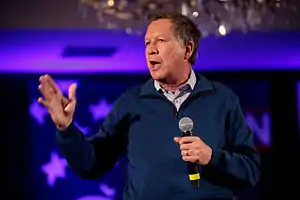
The New Hampshire Republican primary took place on February 9, 2016, where there were 23 bound delegates which were allocated proportionally and a candidate has to get at least 10% of the vote to get any delegates to the Republican National Convention.[8]
Results
| Candidate | Votes | Percentage | Actual delegate count | ||
|---|---|---|---|---|---|
| Bound | Unbound | Total | |||
| Donald Trump | 100,735 | 35.23% | 11 | 0 | 11 |
| John Kasich | 44,932 | 15.72% | 4 | 0 | 4 |
| Ted Cruz | 33,244 | 11.63% | 3 | 0 | 3 |
| Jeb Bush | 31,341 | 10.96% | 3 | 0 | 3 |
| Marco Rubio | 30,071 | 10.52% | 2 | 0 | 2 |
| Chris Christie | 21,089 | 7.38% | 0 | 0 | 0 |
| Carly Fiorina | 11,774 | 4.12% | 0 | 0 | 0 |
| Ben Carson | 6,527 | 2.28% | 0 | 0 | 0 |
| Rand Paul (withdrawn) | 1,930 | 0.68% | 0 | 0 | 0 |
| Write-ins | 2,912 | 1.02% | 0 | 0 | 0 |
| Mike Huckabee (withdrawn) | 216 | 0.08% | 0 | 0 | 0 |
| Andy Martin | 202 | 0.07% | 0 | 0 | 0 |
| Rick Santorum (withdrawn) | 160 | 0.06% | 0 | 0 | 0 |
| Jim Gilmore | 134 | 0.05% | 0 | 0 | 0 |
| Richard Witz | 104 | 0.04% | 0 | 0 | 0 |
| George Pataki (withdrawn) | 79 | 0.03% | 0 | 0 | 0 |
| Lindsey Graham (withdrawn) | 73 | 0.03% | 0 | 0 | 0 |
| Brooks Andrews Cullison | 56 | 0.02% | 0 | 0 | 0 |
| Timothy Cook | 55 | 0.02% | 0 | 0 | 0 |
| Bobby Jindal (withdrawn) | 53 | 0.02% | 0 | 0 | 0 |
| Frank Lynch | 47 | 0.02% | 0 | 0 | 0 |
| Joe Robinson | 44 | 0.02% | 0 | 0 | 0 |
| Stephen Bradley Comley | 32 | 0.01% | 0 | 0 | 0 |
| Chomi Prag | 16 | 0.01% | 0 | 0 | 0 |
| Jacob Daniel Dyas | 15 | 0.01% | 0 | 0 | 0 |
| Stephen John McCarthy | 12 | 0% | 0 | 0 | 0 |
| Walter Iwachiw | 9 | 0% | 0 | 0 | 0 |
| Kevin Glenn Huey | 8 | 0% | 0 | 0 | 0 |
| Matt Drozd | 6 | 0% | 0 | 0 | 0 |
| Robert Lawrence Mann | 5 | 0% | 0 | 0 | 0 |
| Peter Messina | 5 | 0% | 0 | 0 | 0 |
| Unprojected delegates: | 0 | 0 | 0 | ||
| Total: | 285,916 | 100.00% | 23 | 0 | 23 |
| Source: The Green Papers | |||||
Note: Delegates were awarded to candidates who got 10% or more of the vote proportionally. Of the 25 candidate/hopefuls, five candidates garnered delegates.
Results by county
| County | Trump | Kasich | Cruz |
|---|---|---|---|
| Belknap | 35.16% | 15.73% | 12.89% |
| Carroll | 33.95% | 18.55% | 11.05% |
| Cheshire | 33.42% | 16.05% | 13.92% |
| Coos | 36.99% | 15.97% | 10.18% |
| Grafton | 29.36% | 20.83% | 10.35% |
| Hillsborough | 34.89% | 14.89% | 11.43% |
| Merrimack | 33.02% | 18.61% | 11.39% |
| Rockingham | 38.73% | 13.98% | 10.78% |
| Strafford | 33.40% | 14.50% | 15.09% |
| Sullivan | 36.73% | 15.91% | 11.34% |
| TOTAL | 35.23% | 15.71% | 11.63% |
| Source: https://uselectionatlas.org/RESULTS/state.php?fips=33&year=2016&f=0&off=0&elect=2 | |||
General election
Predictions
| Source | Ranking | As of |
|---|---|---|
| Los Angeles Times[9] | Likely D | November 6, 2016 |
| CNN[10] | Tossup | November 4, 2016 |
| Cook Political Report[11] | Lean D | November 7, 2016 |
| Electoral-vote.com[12] | Lean D | November 8, 2016 |
| Rothenberg Political Report[13] | Lean D | November 7, 2016 |
| Sabato's Crystal Ball[14] | Lean D | November 7, 2016 |
| RealClearPolitics[15] | Tossup | November 8, 2016 |
| Fox News[16] | Tossup | November 7, 2016 |
Polling
Up until late October 2016, Democrat Hillary Clinton won almost every pre-election poll. On November 1, just one week before the election, Republican Donald Trump won a poll for the first time, 44% to 42%. In the final week, Trump won 4 polls to Clinton's 2 and one tie. The final poll showed a 45% to 44% lead for Clinton, which was accurate compared to the results.[17] The average of the final 3 polls showed Clinton up 45% to 42%.[18]
Results
| Party | Candidate | Votes | % | |
|---|---|---|---|---|
| Democratic | Hillary Clinton | 348,526 | 47.62% | |
| Republican | Donald Trump | 345,790 | 47.25% | |
| Libertarian | Gary Johnson | 30,694 | 4.13% | |
| Green | Jill Stein | 6,465 | 0.87% | |
| Democratic | Bernie Sanders (write-in) | 4,493 | 0.60% | |
| Republican | John Kasich (write-in) | 1,365 | 0.18% | |
| Independent | Evan McMullin (write-in) | 1,064 | 0.14% | |
| Reform | Rocky De La Fuente | 677 | 0.09% | |
| Republican | Mitt Romney (write-in) | 540 | 0.07% | |
| Republican | Paul Ryan (write-in) | 280 | 0.04% | |
| Republican | Jeb Bush (write-in) | 230 | 0.03% | |
| Republican | Marco Rubio (write-in) | 136 | 0.02% | |
| Republican | Ted Cruz (write-in) | 129 | 0.02% | |
| Republican | John McCain (write-in) | 127 | 0.02% | |
| Libertarian | Ron Paul (write-in) | 98 | 0.01% | |
| Republican | Ben Carson (write-in) | 83 | 0.01% | |
| Libertarian | Vermin Supreme (write-in) | 58 | 0.01% | |
| Democratic | Joe Biden (write-in) | 55 | 0.01% | |
| Republican | Chris Christie (write-in) | 23 | 0.00% | |
| Total votes | 743,117 | 100.00% | ||
By county
| County | Clinton% | Clinton# | Trump% | Trump# | Others% | Others# | Margin% | Margin# | Total |
|---|---|---|---|---|---|---|---|---|---|
| Belknap | 39.11% | 13,517 | 55.89% | 19,315 | 4.99% | 2,122 | -16.78% | -5,798 | 34,558 |
| Carroll | 44.63% | 12,987 | 50.29% | 14,635 | 5.09% | 1,901 | -5.66% | -1,648 | 29,102 |
| Cheshire | 53.66% | 22,064 | 41.04% | 16,876 | 5.30% | 2,818 | 12.62% | 5,188 | 41,121 |
| Coos | 42.94% | 6,563 | 52.03% | 7,952 | 5.03% | 1046 | -9.09% | -1,389 | 15,284 |
| Grafton | 56.89% | 28,510 | 37.93% | 19,010 | 5.18% | 3,454 | 18.96% | 9,500 | 50,115 |
| Hillsborough | 47.26% | 99,589 | 47.46% | 100,013 | 5.29% | 13,835 | -0.20% | -424 | 210,746 |
| Merrimack | 48.98% | 40,198 | 45.91% | 37,674 | 5.11% | 5,515 | 3.07% | 2,524 | 82,064 |
| Rockingham | 44.65% | 79,994 | 50.48% | 90,447 | 4.87% | 10,373 | -5.83% | -10,453 | 179,168 |
| Strafford | 51.33% | 34,894 | 42.77% | 29,072 | 5.90% | 4,873 | 8.56% | 5,822 | 67,980 |
| Sullivan | 46.14% | 10,210 | 48.79% | 10,796 | 5.07% | 1,632 | -2.65% | -586 | 22,129 |
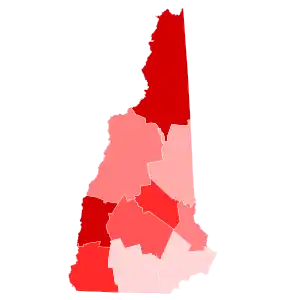

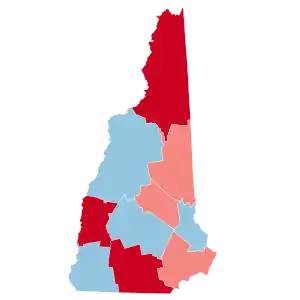
Counties that flipped from Democratic to Republican
- Coös (largest city: Berlin)
- Hillsborough (largest city: Manchester)
- Sullivan (largest city: Claremont)[20]
Results by congressional district
Clinton and Trump each won a congressional district, Trump won one that elected a Democrat.[21]
| District | Clinton | Trump | Representative |
|---|---|---|---|
| 1st | 46.6% | 48.19% | Carol Shea-Porter |
| 2nd | 48.62% | 46.22% | Ann McLane Kuster |
Analysis
Hillary Clinton's margin of victory was the smallest for a Democrat in the state since Woodrow Wilson narrowly won it in 1916. New Hampshire last voted for a Republican, George W. Bush, in 2000, and although Trump did not win New Hampshire, the top-line county results were exactly the same in 2000 and 2016. Despite Trump's narrow loss, this would be the first and only presidential election since 2000 where New Hampshire would vote more Republican than the national average, when the Republican candidate won more of the state's counties, along with the first time since 1976 when the winner of Coos County did not also carry the state as well. Coincidentally, New Hampshire voted as Republican in 2016 as it did Democratic in 2012 and 2020 in comparison to the rest of the nation.
Allegations of voting irregularities
On September 7, 2017, state House speaker Shawn Jasper announced that data showed that 6,540 people voted using out-of-state licenses. Of those, only 15% had received state licenses by August 2017. Of the remaining 5,526, only 3.3% had registered a motor vehicle in New Hampshire. In addition to the close vote for president, Democratic Governor Maggie Hassan defeated incumbent Republican Senator Kelly Ayotte by 1,017 votes. In February 2017, President Trump had told a gathering of senators at the White House that fraudulent out-of-state voting had cost him and Ayotte the election in New Hampshire. Mainstream media disputed Trump's and Jasper's assertion.[22] New Hampshire law permits New Hampshire residents to vote using out-of-state identification if they are domiciled in the state, out-of-state college students attending schools in New Hampshire being one example of such legitimate use of out-of-state identification.[23]
Several investigations by New Hampshire's Ballot Law Commission found no evidence of widespread fraud, and only 4 instances of fraud total in the state for the 2016 elections.[24] Specifically addressing the claim of people being bussed in from out of state to vote, Associate Attorney General Anne Edwards noted that they found no evidence for such claims. When they investigated these claims, they found that the buses were chartered out of state, but the voters on the buses lived in New Hampshire and could legally vote there.[25]
See also
Notes
- The write-ins include 3,248 votes for these 11 Republican presidential candidates: Trump (1795), Kasich (438), Jeb Bush (263), Christie (216), Marco Rubio (203), Ted Cruz (162), Fiorina (99), Carson (52), Paul (12), Gilmore (6), Huckabee (2).[5]
References
- DiStaso, John. "More than 73 percent of NH's voting age population cast ballots, resulting in record turnout". wmur.com. Hearst Television inc. Retrieved April 17, 2022.
- "Distribution of Electoral Votes". National Archives and Records Administration. September 19, 2019. Retrieved December 14, 2020.
- Gregg, Hugh (1997). "First-In-The-Nation Presidential Primary". New Hampshire Almanac. State of New Hampshire. Retrieved August 4, 2016.
- "New Hampshire Democratic Delegation 2016". www.thegreenpapers.com. Retrieved February 23, 2017.
- "2016 Presidential Primary - Democratic President: Summary Democratic Write-ins". New Hampshire Secretary of State. Archived from the original on February 14, 2020. Retrieved February 14, 2020.
- "2016 Presidential Primaries, Caucuses, and Conventions: New Hampshire Democrat Presidential Nominating Process". The Green Papers. December 5, 2019. Archived from the original on February 18, 2018. Retrieved February 10, 2016.
- "2016 Presidential Primary - Democratic President: Summary Democratic 16PP". New Hampshire Secretary of State. February 2016. Archived from the original on February 14, 2020. Retrieved February 14, 2020.
- "New Hampshire Republican Delegation 2016". www.thegreenpapers.com. Retrieved February 23, 2017.
- "Our final map has Clinton winning with 352 electoral votes. Compare your picks with ours". Los Angeles Times. November 6, 2016. Retrieved November 13, 2016.
- Chalian, David (November 4, 2016). "Road to 270: CNN's new election map". CNN. Retrieved March 3, 2019.
- "2016 Electoral Scorecard". The Cook Political Report. November 7, 2016. Retrieved March 3, 2019.
- "2016 Electoral Map Prediction". Electoral-vote.com. November 8, 2016. Retrieved March 3, 2019.
- "Presidential Ratings". The Rothenberg Political Report. Retrieved August 16, 2021.
- Sabato, Larry J. (November 7, 2016). "2016 President". University of Virginia Center for Politics. Retrieved March 3, 2019.
- "2016 Election Maps - Battle for White House". RealClearPolitics. Retrieved November 13, 2016.
- "Electoral Scorecard: Map shifts again in Trump's favor, as Clinton holds edge". Fox News. November 7, 2016. Retrieved November 13, 2016.
- "RealClearPolitics - Election 2016 - New Hampshire: Trump vs. Clinton".
- "RealClearPolitics - Election 2016 - New Hampshire: Trump vs. Clinton".
- Federal Election Commission
- Bump, Philip. "The counties that flipped parties to swing the 2016 election". The Washington Post. ISSN 0190-8286. Retrieved September 1, 2020.
- "Daily Kos Elections' statewide election results by congressional and legislative districts". Daily Kos. Retrieved August 11, 2020.
- Weigel, David, "Election Integrity Commission members accuse New Hampshire voters of fraud", The Washington Post, 8 September 2017' Scarborough, Rowan, "More than 5,000 out-of-state voters may have tipped New Hampshire against Trump", Washington Times, September 7, 2017
- UNH Votes, ""
- "After Exhaustive Investigations, NH Officials Find No Widespread Fraud in Recent Elections". New Hampshire Public Radio. May 29, 2018. Retrieved December 3, 2018.
- "After Exhaustive Investigations, NH Officials Find No Widespread Fraud in Recent Elections". New Hampshire Public Radio. May 29, 2018. Retrieved December 3, 2018.

.jpg.webp)
